Sungkyunkwan University
Sungkyunkwan University (SKKU or simply Seongdae, hangul: 성균관대학교; hanja: 成均館大學校) is a private comprehensive research university in South Korea. The institution traces its origins to the historical Sungkyunkwan founded in 1398 by the Joseon Dynasty located in the heart of central Seoul.[4] As the foremost educational institution of the Joseon Kingdom, it was governed by the great code of the state administration[5] with royal assent.[6] It was restructured into a university in the late nineteenth century, and has since greatly expanded its course offerings and reputation, which is attributed to its numerous influential graduates, strong research output, and close partnership with Samsung.
成均館大學校 성균관대학교[1] | |
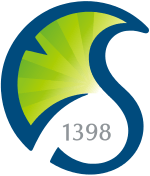 | |
| Motto | 仁義禮智 인의예지 |
|---|---|
Motto in English | Humanity, Righteousness, Propriety, Wisdom[2] |
| Type | Private |
| Established | 1398 |
| Affiliation | Confucianism |
| President | Chung Kyu-sang |
Academic staff | 1,437[3] |
| Students | 25,951[3] |
| Undergraduates | 19,108 |
| Postgraduates | 6,843 |
| Location | , |
| Campus | Urban |
| Colors | Lime Green Blue Orange |
| Mascot | Ginkgo |
| Website | www |
 | |
| Korean name | |
| Hangul | |
| Hanja | |
| Revised Romanization | Seonggyungwan Daehakgyo |
| McCune–Reischauer | Sŏnggyun’gwan Taehakkyo |
The university spends heavily on research and development, mostly funded by its primary sponsor tech-giant Samsung, Hyundai and other government funding agencies, producing high-end research scientists. Among the internationally notable research scientists of the university, professor Park Nam-Gyu of Chemical engineering, who was nominated as one of the potential Chemistry Nobel laureates in 2017 by Clarivate Analytics,[7] and professor Lee Young-hee, director of the Center for Integrated Nanostructure Physics in the Institute for Basic Science, are currently active in research at this university, frequently coming into spotlight in Nature.[8]
Location
The university's main campus, the Humanities and Social Sciences Campus, is in the heart of central Seoul on the same hill as Changdeokgung and Changgyeonggung (two of the royal palaces of Joseon). It is near Hyehwa-dong and Daehangno. The nearest subway station is Hyehwa Station on Seoul Subway Line 4.
The Natural Sciences Campus in Suwon is in walking distance from Sungkyunkwan University Station, in the northwest of the city. The Natural Sciences Campus was established in 1978. This campus is 45 km south of Seoul on a 250-acre site.
Each campus's major is divided according to the distinction between liberal arts and science departments.
History
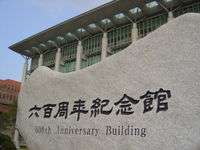
Sungkyunkwan was established in 1398 as the Joseon Dynasty's highest educational institution. Its name means, "Sung (成, to make), Kyun (均, harmonious society), Kwan (館, institute)." It focused on in-depth study of the Chinese Classics, Confucian canon, and literature of the era, and how to apply the knowledge to governing the nation and understanding the nature of humanity. It also served as a shrine (see Munmyo) to the Confucian sages where rituals were held regularly to honor them and their teachings.
It was located within the city walls of the capital during the Joseon period, Hanseong, or modern-day Seoul. It followed the example of the Goryeo-period Gukjagam, which in its latter years was also known by the name "Sungkyunkwan".
Numerous Korean historical figures, including Yi Hwang and Yi I, studied at and graduated from Sungkyunkwan. A considerable amount of Korean literature and works of hanja calligraphy were created and archived by Sungkyunkwan scholars over the centuries.
During the period of Japanese rule in the first half of the twentieth century, Sungkyunkwan was downgraded and almost closed by the Governor-General of Korea in favor of the imperial university. At the end of World War II, however, it was officially reopened as a college by the United States Army Military Government in Korea. Before long, it was reinstated by the ex-rector of Sungkyunkwan, Kim Changsook.
After the Korean War, as the nation modernized and underwent social, political, and economic reforms, SKKU played an important role in academic freedom in higher education and also kept traditional ethics and morality alive in Korean society.
Timeline
- 1398: Sungkyunkwan founded.
- 1400–1418: King Taejong initiates a tradition for royal princes to enter Sungkyunkwan.
- 1475: Jongyeonggak, Korea's first library, is established.
- 1519: Planting of the pair of ginkgo trees (Natural Monument No. 59) that became SKKU's symbol.
- 1592: Munmyo, the Confucian Shrine, is destroyed in a fire.
- 1601: Munmyo is reconstructed.
- 1895: Sungkyunkwan is reformed as a modern three-year university.
- 1911: The university is renamed Kyonghagwon by the Japanese Government-General.
- 1946: Sungkyunkwan receives accreditation from United States Army Military Government in Korea on September 25 as Sunkyunkwan College (성균관대학).[9]
- 1950: Campus buildings, libraries are destroyed in a fire.
- 1953: The university becomes a comprehensive university; the Graduate School is established.
- 1954: The Main Building is constructed (5 stories, 1,333 pyeong).
- 1957: First Science Hall is opened.
- 1958: The Central Library is opened (5 stories, 1,038 pyeong); the Evening College is established.
- 1962: The Administration Building is constructed (4 stories, 1,271 pyeong).
- 1963: The College of Business Administration is established. The First Faculty Hall is constructed.
- 1964: The university museum is opened.
- 1965: The College of Sciences and Engineering is established.
- 1966: The School of Library Services is established. The Evening Graduate Schools are established.
- 1971: The Graduate School of Foreign Trade is established.
- 1972: The College of Education is established.
- 1978: The Natural Sciences Campus opens in Suwon.
- 1981: The Graduate School of Education is established.
- 1983: The Science Library building is constructed.
- 1986: The Susonggwan Gymnasium Complex and Yanghyongwan Student Quarters are constructed.
- 1988: The Graduate School of Confucian Studies is established.
- 1993: The School of Continuing Education is established.
- 1995: The Graduate School of International Cooperation is established.
- 1996: Samsung Group reacquires the university foundation; the Graduate School of Mass Communications and Journalism is established.
- 1997: The College of Medicine, the Graduate School of Design, and the Graduate School of Business Administration are established.
- 1998: 600th Anniversary; the School of Art is established.
- 1999: The Medical Building is constructed.
- 2000: 600th Anniversary Building is constructed; the Business Administration Building is reconstructed.
- 2001: Research Complex 1 is constructed; Wisdom Hall (dormitory) is constructed.
- 2002: The Electronic Microscope Complex is constructed.
- 2002: Construction begins on the Law Building.
- 2003: The 18th President, Dr. Seo Jung-don, is inaugurated.
- 2004: The Law Building is constructed; Su Seon Hall is renovated; Hoam Hall is renovated; the International House is constructed; SKK Graduate School of Business is launched in collaboration with the MIT Sloan School of Management.
- 2005: Research Complex 2 is constructed.
- 2006: The Graduate School of Mobile Systems Engineering, which is sponsored by Samsung Electronics, is established; the PACE (Partners for the Advancement of Collaborative Engineering Education) Center is established; the Semiconductor System Engineering Course, which is sponsored by Samsung Electronics, is established.
- 2007: The Global Business Undergraduate Program is established (dual degree program with Kelley School of Business and The Ohio State University).
- 2008: The Global Economy Undergraduate Program is established (dual degree program with Indiana University and University of Birmingham).
- 2008: International Hall is constructed.
- 2009: The Graduate School of Interaction Science, which is sponsored by South Korea's Ministry of Education, Science and Technology, is established.
- 2011: The 19th President, Dr. Kim Jun-young, is inaugurated.
- 2013: Sungkyunkwan University's Graduate School of Business (GSB) is ranked 51st in the world by the Financial Times (FT)'s 2013 Global MBA (full-time) ranking.
- 2014: Global Center is constructed.
- 2015: The 20th President, Dr. Chung Kyu-sang, is inaugurated.
Partnership with Samsung
Samsung partnered with SKKU in the period of 1965-1977 and renewed the partnership in 1996. The partnership has helped SKKU realize its vision in pursuit of globalization and fostering talented graduates.[10] Through the partnership, SKKU has developed high-quality research infrastructure and achieved excellent human resource management. The partnership also enabled SKKU to develop world-leading academic programs in software development, mobile communications engineering, energy engineering, nanotechnology, business, medicine, and law.[11]
Through the Samsung Global Scholarship Program (GSP), each year 15-25 students are selected for Seoul National University's engineering program or SKKU's Graduate School of Business (SKK GSB). Selected GSP students currently study for three semesters. Previously, it was four semesters, including a possibility of spending a semester at one of SKK GSB's top partner universities in the U.S. (MIT Sloan, Columbia University, Northwestern University's Kellogg School of Management, University of Michigan's Ross School of Business, Dartmouth College's Tuck School of Business or Indiana University's Kelley School of Business).
Rankings and reputation
| QS National[12] | General | 4 |
|---|---|---|
| ARWU National[13] | General | 2 |
| USNWR National[14] | General | 2 |
| QS Asia (Asian Ranking version)[15] | General | 15 |
| THE Asia[16] | General | 10 |
| USNWR Asia[17] | General | 22 |
| THE World[18] | General | 89 |
| QS World[19] | General | 95 |
| USNWR World[20] | General | 188 |
| ARWU World[21] | Research | 151-200 |
According to the ranking of South Korean universities annually published by national daily newspaper JoongAng Daily, Sungkyunkwan University is ranked nationally as the 3rd best university in South Korea after SNU and KAIST.[22] It is the number one private comprehensive research university in South Korea according to U.S. News & World Report.
Internationally, SKKU is ranked 95th in the Quacquarelli Symonds (QS) world university rankings 2020.[23] In the Times Higher Education 2019 world university rankings, SKKU is ranked 82th.[24]
In the QS Asia rankings, SKKU is ranked 15th.[25] The reputation of the university stems from SKKU's international engagement including short-term study abroad programs and dual-degree programs, as well as its industrial partnerships, and its graduate reputation as evidenced in the high employment rate of SKKU graduates.
In the Financial Times, SKK GSB Global MBA is ranked as #42 worldwide, one of the top 10 in Asia, and #1 MBA in Korea.[26]
SKKU's School of Medicine is affiliated with Samsung Medical Center, the top research hospital in Korea. Due to this international ranking and history, SKKU is generally recognized as the top school in Korea, ranking 4th to 5th.
Motto
SKKU's motto, "Humanity, Righteousness, Propriety, and Wisdom (仁, 義, 禮, 智)", reflects the basic spirit of Confucianism. These four cardinal virtues express humankind's four inherent elements of spirit, action, conscience, and intellect. Humanity abides in the heart that loves, righteousness abides in the heart that knows right from wrong, propriety abides in the heart that knows forbearance, and wisdom abides in the heart that perceives. Confucian philosophy attests to man's innate goodness, and at the same time recognizes that this quality must nevertheless be awakened and nurtured. These four principles, which comprise SKKU's educational philosophy, are the basis for higher education's goals of the search for truth and the establishment of social justice, which are, in turn, based on humanity.
University symbol
The university's symbol is the gingko leaf which comes from the giant ginkgo trees at SKKU's old campus (Natural Monument No. 59). Both trees are male and thus do not bear fruit. They are believed to have been planted in 1519 by Yun Tak, a former president of Sungkyunkwan.
Campuses
- Humanities and Social Sciences Campus
- Natural Sciences Campus
Samsung Library
The library is equipped with state-of-the art digital media room where students can have recreational activity like watching movies. The library also offers several CD player stations for amusements, open cafe, sleeping arena where students can take nap if tired.[27]
Learning Factory
SKKU Learning Factory is a student facility at Natural Sciences campus in Suwon where creative ideas can be made into a prototype product using 3D printers, laser cutters, CNC router, and Arduino. It has been established by the Fusion Based Creative Informatics Human Resources Development Team, and it serves as a place where students can realize their ideas and build human connections.
Student housing and dormitories
Sungkyunkwan University offers on-campus dormitories to its students in the campuses which are known as SKKU dorms. Humanities and Social Sciences campus at Seoul offers ten dormitories and housing facilities namely, E-house, G-house, K-house, C-house, I-house, M-house, Crownville A, Crownville C, Victory House, and LWG House whereas, Natural Sciences campus at Suwon offers five dormitories namely, In-gwan, Ui-gwan, Ye-gwan, Shin-gwan Ji-gwan.[28] Dorm culture of the university is vibrant owing to frequent recreational events such as free pizza party, outdoor trip, painting competition, Yoga class and so on targeting its international students. The dorm entrances are secured with automatic RFID key-tag doors which ensure only the students can have legal entry inside. Routine fire-safety and earth-quake safety simulations in the dorms are performed every semester to ensure safety of the students.
Rooms
The dormitories house both male and female students but floors are designated for a specific gender.[28] SKKU dorms provide variety of room types depending on the need, fee and academic results. Students can be offered single/two/four persons rooms. Apartment type facilities are also offered where more than four students live in separate rooms in apartment. All the rooms are equipped with furniture, air-conditioner and free wifi. Special single rooms are reserved for disabled students in Shin-gwan dorm.
Other facilities
Each dormitories are equipped with CCTV and free wifi. Vending machines, printers and ATM machines are available at the entrance of every dorm. Reading rooms and common rooms at each floor with television and microwave oven are available. Laundry rooms are equipped with washing machines, cloth dryer, and electric iron which are free of cost. Some of the dormitories like E-house, Shin-gwan and In-gwan have in-house gym. Having a significantly large international student community, SKKU dorms offer kitchen facilities for all of its students. All kitchens have numbered cabinets allocated to a particular student for a semester.
Research institutes
Sungkyunkwan Advanced Institute of Nanotechnology
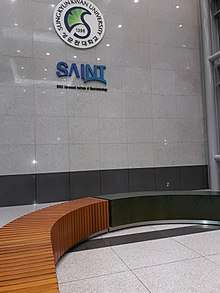
SAINT is the abbreviation of Sungkyunkwan Advanced Institute of Nanotechnology. This institute opened in March 2005.
SAINT was founded on March 1, 2005 as one of the four core programs of Sungkyunkwan University’s VISION2010+ plan to be ranked in the top 100 universities in the world. With the financial support from Samsung Advanced Institute of Technology (SAIT), its goal is to become one of the world's top 5 nanotechnology-related institutes. The current director of SAINT is Michael Grätzel.
N-Center
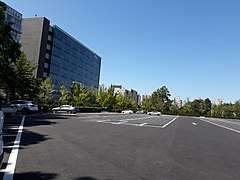
N-center is the home of the Center for Integrated Nanostructure Physics in the Institute for Basic Science. Professor Lee Young-hee is the director of the center, who is an internationally renowned physicist engaged in researches related to nanotechnology.[8] Additionally, the Center for Neuroscience Imaging Research (CNIR) is also located here.[29]
Sungkyun Language Institute
Sungkyun Language Institute (SLI) is a semi-autonomous division of Sungkyunkwan University. English, Japanese, Mandarin and Korean are taught, though Mandarin is not taught at the Suwon campus. Korean is taught at six levels from beginner to advanced. There are 18 lecturers of Korean and 16 foreign lecturers of English at the campus in Seoul, with 14 foreign English lecturers in Suwon, while the two Japanese lecturers based in Suwon are Korean. There are several foreign lecturers of other languages in Seoul and Korean lecturers of English on both campuses. SLI is managed separately from the university and the management follows different systems of organisation on the two campuses, yet they both fall under an umbrella level of administrative management.
Courses
Credit and non-credit classes are taught. The English credit courses are chiefly in academic writing and academic presentation. There are also ESP (English for Specific Purposes) classes in business English, English for scientific purposes, English Literature and current English at the Suwon campus. Non-credit classes are less specialised and are, therefore, more typical of ESL environments. These are open to people who are not registered as students at Sungkyunkwan University. It is not uncommon for members of staff or local residents to attend such classes. For the main courses (academic writing and presentations), SLI produces its own books, which are published by Sungkyunkwan University Press and which have thus far been revised yearly.
Facilities
SLI has a "Global Zone" — a room where students may relax, study, read, browse the web, view online lectures, attend conferences, watch international TV, or seek English assistance from the lecturers on each site.
Notable international programs
Sungkyunkwan University has a high number of international students, making up over 10% of the total undergraduate student body. In 2011, the population of international students at SKKU surpassed 1,000.[30] There were over 2,700 international students enrolled at SKKU in 2013, and each year more than 2,000 Korean students from SKKU go abroad. SKKU maintains partnerships with over 653 universities in over 73 countries around the world, and has agreements with 21 overseas institutions to offer dual-degree programs.[31]
International Summer Semester
A majority of SKKU's international students attend the International Summer Semester (ISS) program, usually held from late June to late July. Started in 2008, it has grown to over 1,500 students from over 65 universities in over 25 countries.
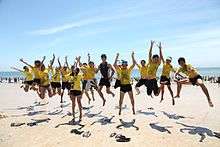
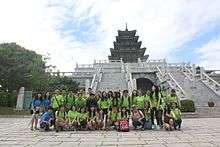
Winter International Student Experience
SKKU's Winter International Student Experience (WISE) is newer than its ISS program. It started in 2015 and occurs ever January for just under four weeks. It is a bit smaller than the ISS with around 200 students from 26 universities and 16 nations each year and growing. It is offered especially for students from warmer regions including Southeast Asia, South America, and Australia to experience winter life in Korea.
Graduate School of Business
The Graduate School of Business (GSB) was established in 2004 with the launching of the Global MBA program.[32] The Global MBA program was the nation's first MBA program to be fully taught in English and was set up in collaboration with MIT's Sloan School of Management and Indiana University's Kelley School of Business, both in the United States. The SKK GSB Global MBA has also been ranked by the Financial Times as the #1 MBA in Korea, Top 11 in Asia and 59th worldwide.[26]
In addition to the MBA program, other subspecialized master's degree programs and dual masters programs are also offered. Its partner institutions include the Sloan School of Management, the Kelley School of Business and UC Berkeley's Haas School of Business in the United States and the EDHEC Business School in France.[33][34]
MGB Program: SKKU is also offering a program called the Master Of Global Business. This program is in partnership with the University of Victoria (Canada) and Montpellier Business School (France). In February, SKUU is welcoming 35 students from 13 different countries. The module mostly focuses on consulting projects with famous Korean companies such as LG, CJ, KB bank etc.[35]
ASLE-Korea
Sungkyunkwan University's Department of English Language and Literature is the birthplace and home of the Korean affiliate of the Association for the Study of Literature and Environment (ASLE-Korea or ASLE-K). ASLE-Korea hosts two conferences a year (Spring and Fall) and publishes Literature and Environment (문학과환경),a journal dedicated to extending ecocritical scholarship, with articles written primarily in Korean and English.
SKKU in popular culture
The old campus of Sungkyunkwan was the setting for the fusion historical drama Sungkyunkwan Scandal, which also starred alumnus Song Joong-ki, about a student who disguises herself as a male to attend the boys-only Confucian academy. The setting resulted in increased interest in SKKU from international audiences who watched the drama.
SKKU is the founding place, and was the primary practice venue of Korean National Cricket Team.[36]
Facilities
Current Library Holdings: 1,830,806 (bound volumes)
- Central Library: 914,228 / Samsung Library: 610,023
- Jongyeonggak Library: 146,187 / Library of Medicine: 11,330 / Law Library: 56,438 / Library of Architecture: 2,600
University Area: 3,593,341 m²
- Humanities and Social Sciences Campus: 1,394,154 m² / Natural Sciences Campus: 2,199,187 m²
- (including Tobong Varsity Teams Training Center: 61,339 m² / Botanical Gardens: 329,222 m² /
- Samchuk Seaside Retreat: 2,390 m²)
Building Area: 344,510 m²
- Humanities and Social Sciences Campus: 141,803 m²
- Natural Sciences Campus: 202,707 m²
Sports facilities
Under the College of Sports Science, several student sports clubs at Sungkyunkwan University are active including baseball club, floor ball club, tennis club, basketball club, soccer club, Volleyball club, and cricket club. Full-size soccer field, basketball playground and baseball fields are located inside the campus.
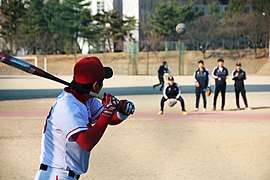 Baseball field at Sungkyunkwan university.
Baseball field at Sungkyunkwan university.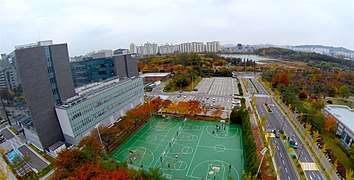 Basketball field.
Basketball field.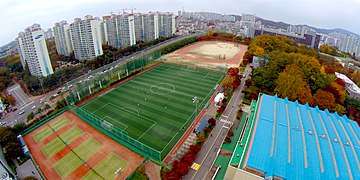 Soccer field.
Soccer field.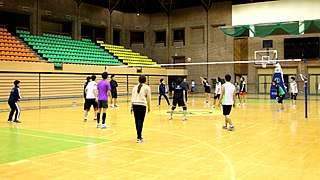 Volleyball playground.
Volleyball playground.
Notable alumni
Politics, diplomacy and public service
- Hwang Kyo-ahn (황교안), former Prime Minister of South Korea, former Acting President of South Korea
- Lee Wan-koo (이완구), former Prime Minister of South Korea
- Chung Hong-won (정홍원), former Prime Minister of South Korea
- Lee Youngjin (이영진), Justice of the Constitutional Court of Korea
- Park Byeong-seug (박병석), Speaker of the National Assembly, National Assembly member for Seo-gu
- Yang Seung-jo (양승조), Governor of South Chungcheong Province, former National Assembly member for Cheonan
- Ko Chang-soo (고창수), Poet and Diplomat
- Lee Jong-seok (이종석), former Minister of Unification
- Choung Byoung-gug (정병국), former Minister of Culture, Sports and Tourism, member of the National Assembly for Yeoju and Yangpyeong
- Ahn Gyu-baek (안규백), member of the National Assembly for Dongdaemun
- Park Yong-jin (박용진), member of the National Assembly for Gangbuk
- Choi Gyung-hwan (최경환) member of the National Assembly for Gwangju North
Sports
- Han Hong-kyu (한홍규), Midfielder for Chungju Hummel FC
- Jung Kwang-seok (정광석), Retired football player and manager for Yongin City FC
- Kim Deok-il (김덕일), Forward for Seongnam Ilhwa Chunma
- Kim In-sung (김인성), Midfielder for Jeonbuk Hyundai Motors
- Kim Mi-hyun (김미현), Professional golfer
- Lee Ho-Jin (이호진), Defender
- Lee Jong-won (이종원), Midfielder for Seongnam Ilhwa Chunma
- Lee Sang-ki (이상기), Goalkeeper for Suwon FC
- Lim Joong-yong (임중용), Retired player and coach
- Mo Chang-min (모창민), Infielder for NC Dinos
- No Jin-hyuk (노진혁), Shortstop for NC Dinos
- Yoon Deok-yeo (윤덕여), Retired
- Kim Byung-hyun (김병현), Former Major League Baseball Pitcher
- Jeon Kwang-In (전광인), Men's National Volleyball Player
- Seo Jae-Duck (서재덕), Men's National Volleyball Player
Entertainment
- Bae Yong-joon (배용준)
- Carlos Gorito (카를로스 고리토)
- Cha Eun-woo (차은우) (Astro)
- Cha Seung-won (차승원)
- Eun Seo (은서) (Cosmic Girls, Joy Unit and Y TEEN)
- Go Ah-sung (고아성)
- Han Soo-yeon (한수연)
- Heo Young Joo (허영주) (The SeeYa and Real Girls Project)
- Hwang In-sun (황인선) (Smile.G)
- Hyomin (효민) (T-ara)
- Jeon Sung-woo (전성우)
- Ji Hyun-woo (지현우)
- Jo Bo-ah (조보아)
- Joo Won (주원)
- Jung Hye-sung (정혜성)
- Kang Ji-young (강지영) (KARA)
- Kim Dae-myung (김대명)
- Kim Ga-young (김가영) (Stellar)
- Kim Hye-soo (김혜수)
- Kim Mu-yeol (김무열)
- Kim Nam-joo (김남주) (Apink)
- Ko Sung-hee (고성희)
- Krystal Jung (정수정) (f(x))
- Kwak Jung-wook (곽정욱)
- Ku Hye-sun (구혜선)
- Lee El (이엘)
- Lee Min-jung (이민정)
- Lee Si-a (이시아) (CHI CHI)
- Lee Tae-hwan (이태환) (5urprise)
- Moon Ga-young (문가영)
- Moon Geun-young (문근영)
- Moon So-ri (문소리)
- Park Chul-soo (박철수)
- Park Joo-mi (박주미)
- Park Se-wan (박세완)
- Park Sol-mi (박솔미)
- Park So-hyun (박소현)
- Seo Ji-hye (서지혜)
- Seo Shin-ae (서신애)
- Seo Ji-hye (서지혜)
- Shin Ye-eun (신예은)
- Song Joong-ki (송중기)
- Swings (문지훈)
- Uee (유이) (After School)
Historical figures
- Jeong Inji (1396-1478) Neo-Confucian scholar, historian, Vice-Minister of Education
- Shin Suk-ju (1417-1475) Prime minister from 1461–64 and 1471–75
- Jo Gwang-jo (1482-1520) Neo-Confucian scholar, martyr one of the 18 Sages of Korea,
- Yi Hwang (1501-1570) Neo-Confucian scholar
- Yi I (1536-1584) Neo-Confucian scholar, politician
- Yu Seong-ryong (1542-1607) scholar, official
See also
| Wikimedia Commons has media related to Sungkyunkwan University. |
- List of Korea-related topics
- List of colleges and universities in South Korea
- Education in the Joseon Dynasty
- Sungkyunkwan
- Education in South Korea
- Daehangno
- Samsung Global Scholarship Program
References
- Abbreviations of Sungkyunkwan University in Korean: 성대(成大; Seongdae). English: SKKU
- Mission & Vision Archived 2014-11-26 at the Wayback Machine, Sungkyunkwan University
- 대학소개>대학현황>현황
- SKKU Official Brochure 2013
- Gyeongguk Daejeon, the great code
- Sungkyunkwan in the code of Gyeongguk Daejeon
- "The 2017 Clarivate Citation Laureates - Clarivate".
- "Always ahead of its time - Nature Index Supplements - Nature Index". www.natureindex.com.
- 자랑스런 성균관 꽃피우는 유교문화 올바른 인성교육 성균관 예절교실. Skkok.com. Retrieved on 2012-05-19.
- Archived 2014-03-13 at the Wayback Machine Global leading programs with Samsung
- "Sungkyunkwan University (SKKU) – Our Organizing Partner". QS-APPLE. Archived from the original on 2014-03-13. Retrieved 13 March 2014.
- "QS South Korea University Rankings 2019". Top Universities. 2019. Retrieved July 20, 2019.
- World University Rankings - 2019 (2019). "South Korea Universities in Top 500 universities". Academic Ranking of World Universities. Retrieved August 16, 2019.
- U.S.News & World Report (2019). "Search Best Global Universities - US News Education". U.S. News & World Report LP. Retrieved July 20, 2019.
- "QS Asian University Rankings". QS Quacquarelli Symonds Limited. 2019. Retrieved August 16, 2019.
- "Times Higher Education Asia University Rankings". Times Higher Education. 2019. Retrieved August 16, 2019.
- U.S.News & World Report (2019). "Best Global Universities in Asia - US News Education". U.S. News & World Report LP. Retrieved July 20, 2019.
- "THE World University Rankings". Times Higher Education. 2020. Retrieved October 19, 2019.
- "QS World University Rankings". QS Quacquarelli Symonds Limited. 2020. Retrieved August 16, 2019.
- U.S.News & World Report (2019). "Best Global Universities - US News". U.S. News & World Report LP. Retrieved July 20, 2019.
- "Academic Ranking of World Universities". Institute of Higher Education, Shanghai Jiao Tong University. 2019. Retrieved August 16, 2019.
- "SNU tops university rankings again this year". Korea JoongAng Daily.
- "QS World University Rankings 2020". 9 September 2019.
- "World University Rankings". 1 October 2018.
- "QS University Rankings: Asia 2018". 23 November 2018.
- "Global MBA Ranking 2019". Financial Times. Retrieved 29 November 2019.
- Kelly, Toni (14 April 2012). "Exploring Learning Spaces and Libraries in Asia: Sungkyunkwan University - Samsung Library".
- "SKKU BONGRYONG HAKSA". dorm.skku.edu.
- Science, ibs,기초과학연구원,ibs Institute for Basic. "Research Centers - Life Sciences -". www.ibs.re.kr.
- Kwon, Jungyun (16 December 2011). "Korea's international students reach out". Korea.net. Retrieved 10 March 2014.
- Oh, Kyu-wook (9 October 2013). "SKKU on path to become top global university". Korea Herald. Retrieved 10 March 2014.
- "Why SKK GSB? — History of SKK GSB". gsb.skku.edu.
- "Full-time MBA — Dual Degree Program". gsb.skku.edu.
- "Global Economic Transformation & Technology program (GETT)". gsb.skku.edu. February 2018.
- https://www.uvic.ca/gustavson/gill/mgb/paths/index.php
- ARIRANG TV (2013-09-23), Arirang Prime Ep214 Bowling for Gold, retrieved 2017-12-27
